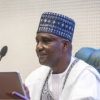The Media Rights Agenda (MRA) launched a groundbreaking report on Monday, highlighting the risks posed by an inadequate national response to environmental and climate challenges to ecosystems, public health, livelihoods, and national stability. The report calls for a more robust implementation of frameworks for access to environmental information in Nigeria to mitigate their negative impact. The
The Media Rights Agenda (MRA) launched a groundbreaking report on Monday, highlighting the risks posed by an inadequate national response to environmental and climate challenges to ecosystems, public health, livelihoods, and national stability. The report calls for a more robust implementation of frameworks for access to environmental information in Nigeria to mitigate their negative impact.
The organisation warned that environmental and climate challenges have already caused significant loss of life, displacement, and costly damage. Without timely, reliable environmental information, the public cannot meaningfully engage in governance or contribute solutions to these crises.
In a statement released in Lagos to commemorate this year’s International Day for Universal Access to Information (IDUAI), MRA Programme Officer Ms Ayomide Eweje noted: “While Nigeria has established a comprehensive framework of constitutional protections, statutory provisions, regulatory mechanisms, and international commitments that provide a solid basis for transparency and accountability, significant challenges persist. These include a lack of willingness among public institutions and officials to disclose information, as well as limited capacity among citizens to request and effectively utilise such information.”
According to her, “Critical to a national response framework is the right of citizens to access timely and reliable environmental information, without which their effective participation in environmental governance and the protection of their rights will not be possible. However, ensuring access to environmental information is not just about compliance with the law alone; it is also about empowering people to protect their health, livelihoods, and environment; hold duty bearers accountable; and build a future where development does not come at the expense of sustainability.”
Titled: “Access to Environmental Information and the Cost of Ignorance in Nigeria,” the report highlights Nigeria’s severe environmental challenges, including deforestation, flooding, desertification, oil pollution in the Niger Delta, poor disposal of plastic waste, and worsening air and water quality, which it identifies as problems that threaten ecosystems, public health, livelihoods, and national stability. It argues that access to environmental information is not a luxury but a necessity that is central to environmental democracy, public participation, and government accountability.
Examining Nigeria’s constitutional guarantees, statutory and regulatory frameworks and international obligations, the report identifies both opportunities and gaps in ensuring effective citizens’ access to environmental information and participation in environmental governance.
It examines laws such as the Freedom of Information Act, Climate Change Act, Environmental Impact Assessment Act, and regulations under the National Environmental Standards and Regulations Enforcement Agency (NESREA) among others, while also situating Nigeria’s commitments within the African Charter on Human and Peoples’ Rights, the Revised African Convention on the Conservation of Nature and Natural Resources (Maputo Convention), ECOWAS Environmental Policy, and global agreements such as the Paris Agreement and the UN Convention on Biological Diversity.
The report underscores the potential of digital technology, including Artificial Intelligence (AI), to improve environmental monitoring, early warning systems, and public access to real-time data. However, it warns that weak enforcement of laws, including lack of proactive disclosure of relevant information by public institutions and other actors, and the exclusion of marginalized communities, particularly rural women, from decision-making, threaten Nigeria’s ability to manage its environmental crisis.
Ms Eweje said: “The cost of environmental devastation in Nigeria is already staggering, running into billions of dollars annually in destruction of public and private property, facilities and infrastructure; the displacement of millions of citizens; and the loss of thousands of lives. Without meaningful and effective access to environmental information, citizens cannot protect their health and livelihoods, or hold decision-makers accountable. This report underscores the urgency of transparency and public participation in environmental governance.”
She therefore called on Federal and State Governments to ensure access to environmental information for citizens, particularly in the digital era, where data availability and transparency are crucial to accountability, saying that to achieve this, authorities must strengthen and enforce laws that mandate proactive disclosure of environmental information in user-friendly and digital formats; and create centralised, open-access data portals where citizens can easily obtain updates on issues such as pollution levels, deforestation rates, water quality, and climate risks.
Ms Eweje argued that it is equally important to address structural inequalities, including the challenges faced by rural communities and women who are often marginalised in both digital access and environmental decision-making, stressing that “Governments must, therefore, invest in broadband expansion, solar-powered digital hubs, and community-based ICT centres to bridge the rural digital divide.”
She called on civil society organisations and the media to engage in the monitoring and reporting of environmental hazards and collaborate with other stakeholders, including academic and research institutions, the private sector and technology companies to ensure that environmental information is not only available but also accessible, comprehensible, and actionable.



















